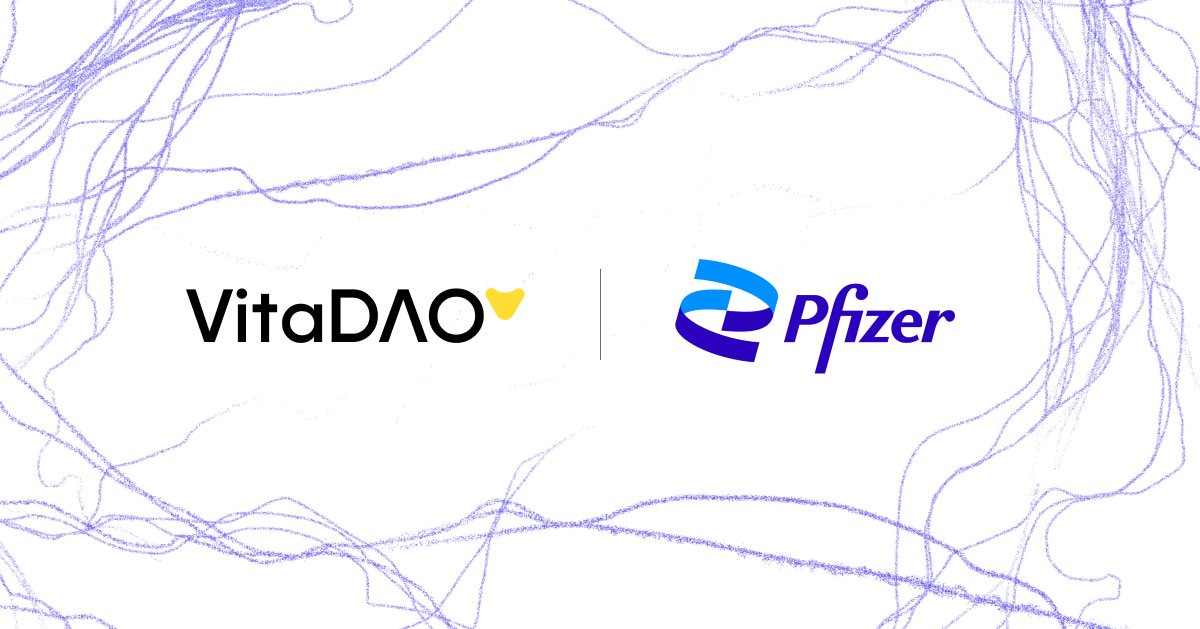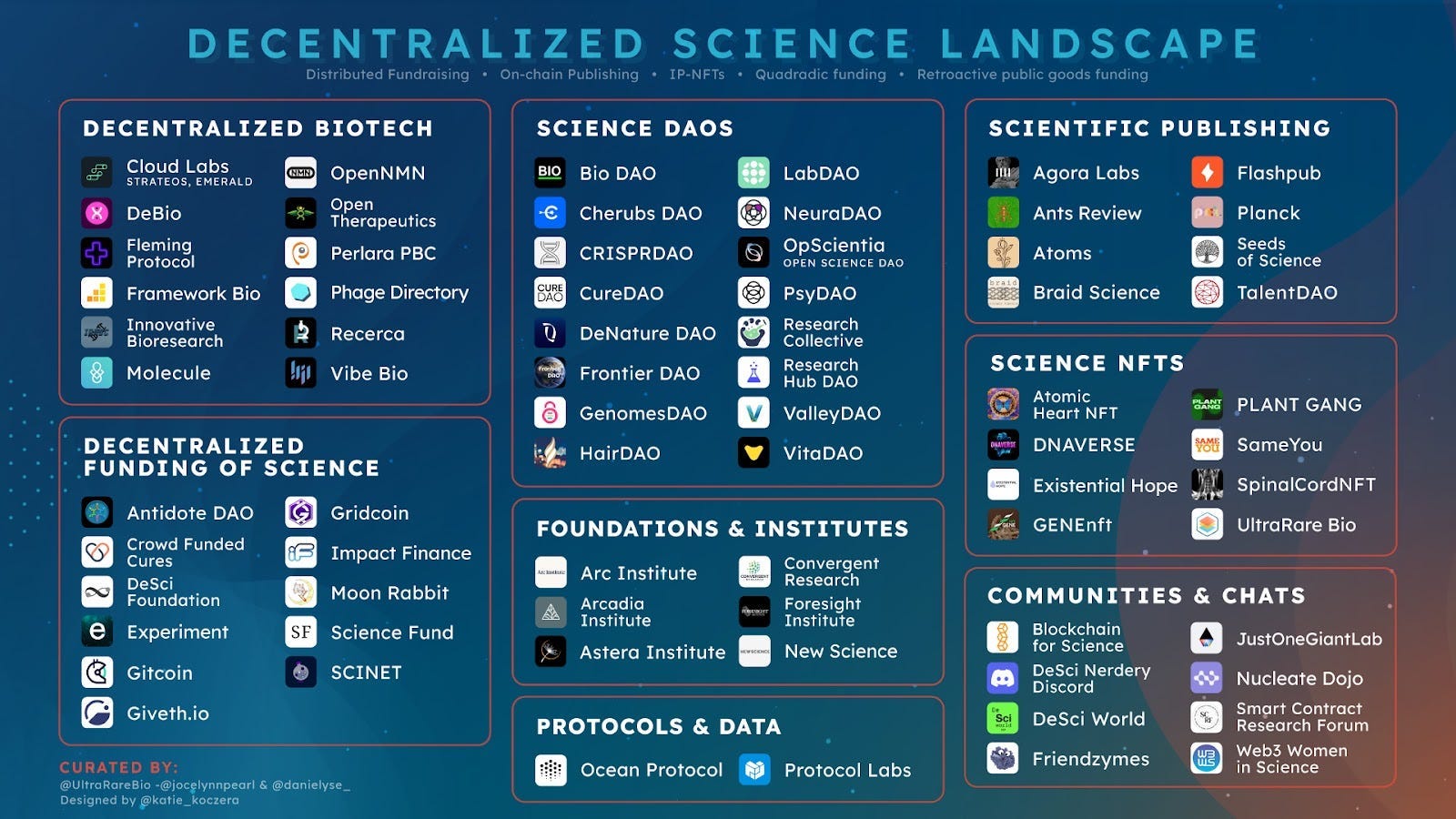VitaDAO: Pfizer-Invested Longevity Research, A New Paradigm for Decentralized Science?
Author: @0xMavWisdom On 30 January, DeSci track longevity startup VitaDAO announced the completion of a $4.1 million funding round from Balaji Srinivasan, former CTO of Coinbase, and Pfizer Ventures, the investment arm of Pfizer, the world's largest pharmaceutical company, marking Pfizer's first investment in the Web3 space. VitaDAO will use the funding to further fund longevity research projects and biotech startups that will be spun out of DAO next year. As a result of the news, the VitaDAO governance Token VITA rose by 60% in a short period of time. DeSci (Decentralised Science) is an initiative to create a public infrastructure for the fair and equitable funding, creation, review, crediting, storage and dissemination of scientific knowledge using Web3 tools, including NFT, smart contracts and DAO. While humanity has experienced an exponential wave of technological development in the last two centuries, there are still various financial and information access barriers in reality, and the combination of technology and Web3 may be one way to address the pain points. Vitalik Buterin, the founder of Ethereum, has also spoken about the use of quadratic funding and DAO tools such as VitaDAO to fund and organise scientific projects in a show on decentralised science. In this article, I will briefly analyse the DeSci space, using VitaDAO as an example from the biotech sector. Funding For a long time, many biotech organisations have only been able to raise funds through traditional channels such as equity financing, bank loans and government funding, but due to the cumbersome R&D process of most biotech startups or organisations, it takes a relatively long period of time even if the organisation eventually succeeds. In a boom scenario, financiers would have been patient enough to invest in startups with only a concept but no product, but with the Federal Reserve raising interest rates over the past year to curb monetary liquidity, hot money has flowed out of these high-risk startups. The poor performance of Cathie Wood's biotech fund ARKG in 2022 is further evidence of the limits of capital on scientific development, with many companies in the sector having to cut expenses to survive by laying off staff and reducing development costs, but at the same time slowing down the growth of the industry. VitaDAO has funded more than 15 projects in the past year to study diseases of aging for a total of more than $3.5 million, and these attempts by biotech companies or organisations to raise funds in the Web3 space can be considered a great innovation. On the one hand, this can be seen in the change in access to funding, with startups being able to obtain funding through DAO organisations with a majority vote of Token holders. VitaDAO provides funding for startups either through traditional equity or by issuing and selling NFTs designed to represent intellectual property. In return for research funding, DAO members become co-owners of the intellectual property generated by the research. On the other hand, it will improve the research status of unpopular projects. In the past, the research direction can only be determined by the capital of institutions. It is more inclined to fund projects with short research and development cycles or large influence. The situation that some unpopular but possibly subversive research and development are blocked will be improved. Information exchange Much of the restricted output or access to scientific information today can be attributed to corporate and government monopolies on information and data, similar to the expensive payment thresholds that block people's access to NKI and Elsevier, and the potential for governments to interfere politically with scientific information, dampening people's enthusiasm to access or export knowledge. The decentralised model not only lowers the barriers to entry for organisations, but also reduces the difficulty for individuals to export or access professional information, helping to eliminate information silos. Firstly, the emergence of DeSci can help to make knowledge dissemination more inclusive by removing the middleman between scientific researchers and reviewers. When information no longer has a monopoly, not only professionals in the relevant field benefit, but even amateurs who have not studied the relevant field can also access information, further contributing to the equalisation of knowledge. Secondly, community incentives will also fuel the active export of information. VitaDAO will not only give certain VITA Token incentives to researchers and working groups who contribute data or expertise, but will also provide additional governance privileges. In addition, the blockchain's censorship-resistant nature, decentralised storage technology, is used so that scientists or specific communities can truly own scientific data. In the past, we only saw DeSci more in academic research and publishing, VitaDAO widened DeSci by conducting clinical trials with Mantis Photonics and obtaining new data from Morten Scheibon-Knudsen's laboratory at the University of Copenhagen and Victor Korolchuk's laboratory at Newcastle University The application scenario of DeSci, so that the development of the next stage. As DeSci organisations such as VitaDAO, Antidote DAO and Dynamiculture grow in size, we will not only see further extension of the scene in the future, but also the opportunity to see collaborative projects that cross borders and academic boundaries. Projects such as the Covid-19 vaccine, which could benefit the world, but which cannot be shared due to various factors, may break through in the future. Problem To be clear, DeSci is still in its infancy, and the field still has questions about "whose interests will DeSci ultimately serve? ""Does DeSci lack a clear set of shared values? "and other general problems. The most important of these questions to consider is what people are building DeSci for in the end. As cognitive neuroscientist Sarah Hamburg says, DeSci is simply a tool for science, allowing scientists to integrate seamlessly into their daily work. DeSci should focus on empowering scientists to do good scientific research and get back to science, rather than focusing too much on these new tools themselves and allowing them to be reduced to financial products that are exploited for hype. Reference: 1. Sarah Hamburg "A Guide to DeSci, the Latest Web3 Movement" https://future.com/what-is-decentralized-science-aka-desci/ 2. Chenglin Pua "The Rise of "Decentralized Science (DeSci)" https://mp.weixin.qq.com/s/JCciOY5yc8V2ivBqGIxAeQ Follow us Twitter: https://twitter.com/WuBlockchain Telegram: https://t.me/wublockchainenglish Wu Blockchain is free today. But if you enjoyed this post, you can tell Wu Blockchain that their writing is valuable by pledging a future subscription. You won't be charged unless they enable payments. |
Older messages
Analysis of Degen Zoo: $20,000 for 30 days of development, DAOMaker's founder "go into business" himself
Tuesday, January 31, 2023
Author: @0xMavWisdom Note: This article is for information sharing only and does not endorse the project and is not intended as any investment advice. The development of an animal NFT game called Degen
Global Crypto Mining News (Jan 23 to Jan 29)
Monday, January 30, 2023
1. Bankrupt crypto lender BlockFi plans to sell loans backed by 68000 bitcoin miners for about $160 million. Sources familiar with the matter said that given the current price of bitcoin miners, some
Asia's weekly TOP10 crypto news (Jan 23 to Jan 29)
Sunday, January 29, 2023
Author:Lily Editor:Colin Wu 1. A large number of Chinese crypto entrepreneurs have relocated to Singapore link A large number of crypto entrepreneurs from China have relocated to Singapore in the past
Former PBOC Monetary Policy Member Huang Yiping: China Bans Cryptocurrencies, May Miss Development Opportunities
Sunday, January 29, 2023
Source: https://www.wu-talk.com/index.php?m=content&c=index&a=show&catid=10&id=11126 Huang Yiping, professor of finance and economics at the National School of Development of Peking
Weekly project updates: Ethereum “shadow fork” of Shanghai upgrade is live, TON validators to vote on suspending 1…
Saturday, January 28, 2023
1. Circle to launch Cross-Chain Transfer Protocol (CCTP) link Circle will launch Cross-Chain Transfer Protocol (CCTP), which is a permissionless on-chain utility that can burn native USDC on a source
You Might Also Like
Interview with MicroStrategy Founder Michael Saylor: The Company Holding the Most Bitcoin in the World
Thursday, February 27, 2025
In this interview, Colin from WuBlockchain had an in-depth discussion with MicroStrategy founder Michael Saylor about the company's ongoing Bitcoin acquisition strategy, the growing adoption of
Abu Dhabi Invests $436.9M In Bitcoin ETF
Thursday, February 27, 2025
February 17th, 2025 Sign Up Your Weekly Update On All Things Crypto TL;DR Abu Dhabi Invests $436.9M In Bitcoin ETF Changpeng Zhao Sparks Meme Coin Rumours Coinbase Finally Lists POPCAT & PENGU
📈 BTC’s realised price (average acquisition price) reached an all-time high of $43,000; State of Wisconsin Invest…
Thursday, February 27, 2025
BTC's realised price reached an all-time high of $43000; Abu Dhabi's Mubadala Investment disclosed its BTC ETF holdings; South Korea to allow universities and charities to sell crypto donations
HashKey Exchange's Interpretation of the Hong Kong SFC Virtual Asset Roadmap
Thursday, February 27, 2025
We are pleased to see the Hong Kong government release the forward-looking and pragmatic “ASPI-Re” roadmap for advancing the virtual asset industry. ͏ ͏ ͏ ͏ ͏ ͏ ͏ ͏ ͏ ͏ ͏ ͏ ͏ ͏ ͏ ͏ ͏ ͏ ͏ ͏ ͏ ͏ ͏ ͏ ͏ ͏
Argentina’s stock market plummets amid President Javier Milei’s LIBRA memecoin scandal
Thursday, February 27, 2025
Argentina's economic landscape shaken as Milei's LIBRA endorsement turns into multi-billion dollar fiasco. ͏ ͏ ͏ ͏ ͏ ͏ ͏ ͏ ͏ ͏ ͏ ͏ ͏ ͏ ͏ ͏ ͏ ͏ ͏ ͏ ͏ ͏ ͏ ͏ ͏ ͏ ͏ ͏ ͏ ͏ ͏ ͏ ͏ ͏ ͏ ͏ ͏ ͏ ͏ ͏ ͏ ͏ ͏
Heated AMA Debate: 0G Team Responds to Allegations of CFX Soft Rug, Overvaluation, and Token Commitment Concerns
Thursday, February 27, 2025
This AMA primarily focused on the relationship between Conflux and 0G Labs, discussing 0G Labs' high valuation, fundraising structure, technical direction, and community concerns over transparency.
Pectra: Ethereum’s Next Major Upgrade
Thursday, February 27, 2025
Breaking down key changes included in Ethereum's Pectra hard-fork ͏ ͏ ͏ ͏ ͏ ͏ ͏ ͏ ͏ ͏ ͏ ͏ ͏ ͏ ͏ ͏ ͏ ͏ ͏ ͏ ͏ ͏ ͏ ͏ ͏ ͏ ͏ ͏ ͏ ͏ ͏ ͏ ͏ ͏ ͏ ͏ ͏ ͏ ͏ ͏ ͏ ͏ ͏ ͏ ͏ ͏ ͏ ͏ ͏ ͏ ͏ ͏ ͏ ͏ ͏ ͏ ͏ ͏ ͏ ͏ ͏ ͏ ͏ ͏ ͏ ͏
Solana falls to lowest price since November 2024 losing 43% since January
Thursday, February 27, 2025
Volatility reigns as Solana's price retreat tests its resilience against past support levels. ͏ ͏ ͏ ͏ ͏ ͏ ͏ ͏ ͏ ͏ ͏ ͏ ͏ ͏ ͏ ͏ ͏ ͏ ͏ ͏ ͏ ͏ ͏ ͏ ͏ ͏ ͏ ͏ ͏ ͏ ͏ ͏ ͏ ͏ ͏ ͏ ͏ ͏ ͏ ͏ ͏ ͏ ͏ ͏ ͏ ͏ ͏ ͏ ͏ ͏ ͏ ͏
Five Projects with Real-World Revenue Scenarios Utiling Token Empowerment
Thursday, February 27, 2025
Memecoin once captured significant attention and investment with its unique culture, humorous image, and community-driven characteristics. ͏ ͏ ͏ ͏ ͏ ͏ ͏ ͏ ͏ ͏ ͏ ͏ ͏ ͏ ͏ ͏ ͏ ͏ ͏ ͏ ͏ ͏ ͏ ͏ ͏ ͏ ͏ ͏ ͏ ͏ ͏
DeFi & L1L2 Weekly — 📉 Transactions on the Bitcoin network dropped to a 1-year low. The Ethereum Foundation alloc…
Thursday, February 27, 2025
Transactions on the Bitcoin network dropped to a 1-year low. The Ethereum Foundation allocated 45000 ETH to DeFi protocols. Standard Chartered established a JV to issue a HKD-backed stablecoin ͏ ͏ ͏ ͏

